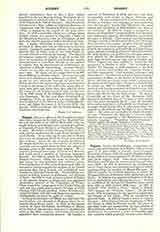

Nugent, FRANCIS, priest of the Franciscan Capuchin Order, founder of the Irish and the Rhenish Provinces of said order; b. in 1569 at Brettoville, near Armagh, Ireland, according to some; according to others, at Moyrath, County Meath; d. at Charleville, France, in 1635. His father was Sir Thomas Nugent of Moyrath, and his mother was the Lady Mary, daughter of Lord Devlin. At an early age he was sent to France to receive an education which the Penal Laws denied him at home. Before the age of twenty he obtained the degree of doctor at the Universities of Paris and Louvain, and occupied chairs in these two centers of learning, prior to his entrance into religion. He acquired a profound knowledge of Greek and Hebrew, and could speak a number of European languages fluently. In 1589 he joined the Capuchin Flandro-Belgian Province, taking the name of Francis. In due course he was professed and ordained priest. Towards the close of 1594, or the beginning of 1595, he was sent to France to guide the destinies of the French provinces then being formed, and established communities at Metz and Charleville. Meanwhile he continued to deliver lectures in philosophy and theology at Paris. In 1596 he went as custos-general of France to the general chapter at Rome, and was appointed commissary general of the Capuchins at Venice. Three years later, being again in the Eternal City, he took part in a public disputation in theology at which Clement VIII himself presided. Father Francis maintained his thesis with skill and eloquence, and was enthusiastically awarded the palm of victory.
At the general chapter of 1599 he was relieved of the provincialate and returned to Belgium, where he remained about eleven years. In 1610, at the earnest request of John Zwickhard, Archbishop of Mainz, seven friars of this province were sent to establish the order in the Rhine country, and Father Francis was appointed their commissary general. He founded a convent at Paderborn in 1612, and two years later communities were settled at Essen, Munster, and Aachen. He also established the Confraternity of the Passion at Cologne, and amongst its first protectors were his two great friends Msgr. Albergatti, the papal nuncio, and Frederick of Hohenzollern, the dean of the cathedral. In 1615 he began a monastery at Mainz, and Pope Paul V nominated him vicar Apostolic and commissary general, with full power to establish the order in Ireland. That country was then passing through a period of terrible persecution, but the Capuchins braved every danger, mingled with the people, and ministered to their spiritual needs. Meanwhile, in 1618, the monastery of Charleville, in Upper Champagne, became a training school for friars intended for the Irish mission, and facilities for the same purpose were offered by the Flandro-Belgian Province. A fresh band of workers was soon sent to Ireland, and Father Nugent was thus enabled to found the first monastery in Dublin in 1624. The Archbishop of Dublin, Dr. Fleming, in 1629 addressed to the Irish clergy a letter commending the Capuchin Fathers, specially mentioning “their learning, prudence, and earnestness”. Two years later Father Nugent founded a monastery at Slane, in the diocese of his friend, Dr. Dease, who had previously borne public testimony to the merits of the Capuchins. Owing to failing health, he retired in 1631 to Charleville. He is generally credited with having procured the foundation at Lille of a college for the free education of poor youths from Ulster and Meath for the Irish clergy. He died at Charleville on the Feast of the Ascension, 1635. Rinuccini described him as “a man of most ardent zeal and most exemplary piety”, and the annalists of the order state that he refused the Archbishopric of Armagh offered him by Pius V, who styled him “the support of the Church and the light of the orthodox faith”. He wrote several works, of which the principal are: “Tractatus De Hibernia”, “Cursus philosophicus et theologicus”, “De Meditatione et Conscientiae examine”, “Paradisus contemplantium”, “Super regula Minorum, Expositio Copiosa”.
FATHER AUGUSTINE

